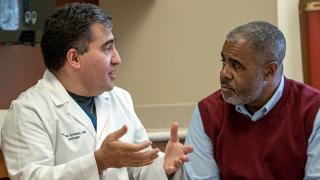Survival rates for prostate cancer in Arizona are significantly lower than those across the United States, according to the American Cancer Society’s (ACS) 2024 Cancer Statistics Report. And although the number of Arizonans diagnosed with the condition went down over the past year, death rates have gone up. What might be behind these numbers?
“One likely cause for worse mortality is delay in receiving care,” says Dr. Farshid Sadeghi, M.D., medical director at the Genitourinary Cancer Center of City of Hope® Phoenix. “This is an issue in states where large swathes of the population do not have insurance coverage, and Arizona, unfortunately, counts among those states.”
But there is positive news, Dr. Sadeghi says.
“Prostate cancer is one of only a few cancers that has a screening test and that is treatable at all stages.”
This article covers a range of topics, including:
- Why prostate cancer may be more deadly in Arizona
- Prostate cancer screening is key
- Arizona prostate cancer treatment
- The future of prostate cancer care
If you or a loved one has recently been diagnosed with prostate cancer and are looking for a second opinion, call us 24/7 at (877) 524-4673.
Why Prostate Cancer May Be More Deadly in Arizona

In the United States, the death rate for prostate cancer is around 11%. In Arizona, it is more than 19%.
According to Dr. Sadeghi, the root causes may be “access to health care and patients’ decisions about seeking care, as I don’t believe we have any environmental factors that would explain higher mortality rates.”
The ACS report also confirmed what other studies have shown: that prostate cancer is much more common among African-American men than those from other ethnic groups.
“This is likely multifactorial,” says Dr. Sadeghi. “There is strong evidence that there is a genetic component, since African Americans who do not have barriers to obtaining health care still have higher mortality.”
But given that African Americans make up less than 5% of the Arizona population, access to care and insurance coverage are likely the biggest factors.
Prostate Cancer Screening Is Key
For many men, prostate cancer can have few or no symptoms. However, with early and appropriate screening, the five-year survival rate for prostate cancer is more than 97%.
Risk factors for prostate cancer include:
- Being over 50
- Being over 40, for men at higher risk
- Having a first-degree relative who has or had prostate cancer
- Being of African-American ancestry
- Some inherited genetic mutations, such as those associated with BRCA1 or BRCA2 genes
“However, the vast majority of men diagnosed with prostate cancer do not have any risk factors,” says Dr. Sadeghi.
The most effective early prostate cancer screening method, according to Dr. Sadeghi, is a prostate-specific antigen (PSA) test. PSA is a protein that is produced by both healthy and cancerous tissue in the prostate. A PSA test is a blood test that measures the amount of PSA in the body. Although a higher PSA level does not necessarily mean you have prostate cancer, it can be useful in determining whether you should undergo other screenings.
“I strongly advocate for PSA screening, as it leads to significant downstaging for cancer and makes prostate cancer easier to treat,” says Dr. Sadeghi, who recommends that all men undergo baseline PSA testing at age 40 and that men at higher risk begin regular testing at the same age.
After age 50, all men should be tested regularly. If their PSA levels increase, their primary care doctor can refer them to a specialist, who may suggest other screening options, such as imaging or biopsy.
Arizona Prostate Cancer Treatment
Every patient is different, and many factors come into play when creating an effective prostate cancer treatment plan. These include the cancer’s stage and how fast it may be growing, a patient’s age and their overall health.
Some of the most common treatment choices for prostate cancer patients at City of Hope Phoenix include:
- Active surveillance, which refers to monitoring slow-growing or early-stage prostate cancer using methods such as PSA testing and digital rectal examination
- Surgery to remove the prostate and some of the tissue surrounding it, which can be performed using innovative techniques, such as a robotic prostatectomy
- Radiation therapy for prostate cancer, which may be used to kill cancer cells or to shrink a tumor before surgery
- Drug therapies, such as chemotherapy, immunotherapy or hormone therapy, which are often used with other treatment methods
Having access to all of these options can help boost prostate cancer survival for many men.
The Future of Prostate Cancer Care
Clinical trials are another potential treatment option for some prostate cancer patients. Prostate cancer researchers at City of Hope, for instance, are currently running trials that focus on:
- Using CAR T cell therapy for certain types of advanced prostate cancer
- Adding PARP inhibitors to treatment plans for patients with hormone-sensitive prostate cancer
- Studying the best and safest ways to use radium Ra 223 dichloride injections as part of treatment
- Determining whether a white button mushroom supplement is clinically effective at managing or reducing PSA levels
The goals of this innovative research, Dr. Sadeghi stresses, are to help catch prostate cancer earlier, treat it more effectively and improve quality of life for patients — “because treatment leads to prolonged survival.”
If you or a loved one has recently been diagnosed with prostate cancer and are looking for a second opinion, call us 24/7 at (877) 524-4673.
